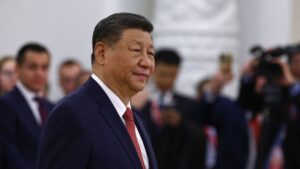
Israeli Prime Minister Benjamin Netanyahu visits the Soroka Hospital in the southern city of Beersheba, after it was hit by a missile fired from Iran on June 19, 2025. Israel's defence minister warned that Iran's supreme leader "can no longer be allowed to exist" after a hospital was hit in an Iranian missile strike on June 19, spiking tensions in the week-old war. (Photo by Marc Israel SELLEM / POOL / AFP) (Photo by MARC ISRAEL SELLEM/POOL/AFP via Getty Images)
JERUSALEM – In a series of decisive military actions, Israel has reasserted its dominance in the Middle East, reshaping regional dynamics just two years after a surprise attack caught the nation off guard.
Breaking: Ceasefire Marks a Temporary Halt
The ceasefire between Israel and Iran, following 12 days of intense airstrikes, signals a pause in the major conflicts that erupted after the Hamas attack on October 7, 2023. However, unresolved political disputes continue to threaten lasting peace in the region.
Israel’s military campaign resulted in significant losses for Iran and its proxies, altering the balance of power in the Middle East.
Immediate Impact on Regional Power Structures
Israel’s military operations have not only targeted Iran’s nuclear sites and military facilities but also decimated the leadership of allied groups like Hamas and Hezbollah. This strategic offensive has left Iran’s network of proxies, known as the “axis of resistance,” severely weakened.
Despite these military victories, Israel’s international reputation has suffered due to the humanitarian crisis in Gaza and the high number of civilian casualties.
Key Details Emerge from Recent Conflicts
From the initial Israeli airstrike on June 13, the nation has demonstrated its air superiority, challenging Iran’s long-standing position as a formidable adversary. The ousting of Syria’s Bashar al-Assad, while not directly orchestrated by Israel, further diminished Iran’s influence in the region.
“The Iranian camp is decimated and beaten to smithereens,” said Hussein Ibish of the Arab Gulf States Institute in Washington.
Strategic Military Successes and Their Limits
While Israel has reduced immediate security threats, the underlying political issues, particularly regarding the Palestinians, remain unresolved. The ongoing conflict in Gaza has resulted in significant Palestinian casualties, with more than 56,000 deaths reported, most of them civilians.
The Palestinian call for statehood continues to garner support, leading to political protests and legal actions against Israel.
Expert Analysis on Regional Implications
Vali Nasr, an Iran expert at Johns Hopkins University, noted that Israel’s military maneuvers have created new opportunities in Lebanon, Syria, and Gaza. However, he cautioned that these successes do not address the broader political challenges.
The potential for diplomatic breakthroughs, such as formal ties between Israel and Saudi Arabia, remains contingent on progress toward a Palestinian resolution.
Background Context and Future Outlook
Israel’s recent actions have been supported by the United States, as evidenced by joint airstrikes on Iran’s nuclear facilities. Despite moments of tension, the U.S.-Israel alliance remains strong, with President Trump publicly supporting Israeli Prime Minister Benjamin Netanyahu.
“Bibi and I just went through HELL together,” Trump remarked, highlighting the close cooperation between the two leaders.
Looking ahead, Israel’s military confidence suggests a continued focus on securing its regional interests. However, experts warn that without political solutions, the Middle East may return to a dangerous stalemate.
As the situation evolves, the international community watches closely, understanding that the outcomes of these developments will have far-reaching implications for the region’s future stability.







